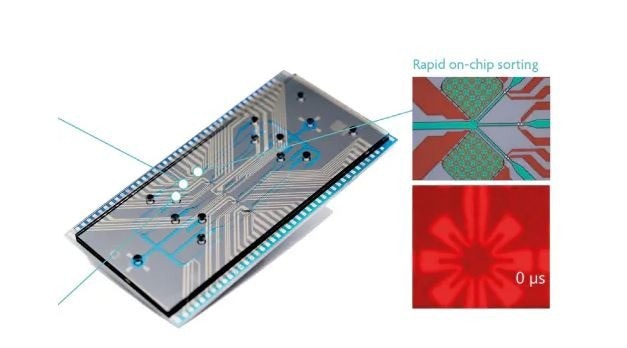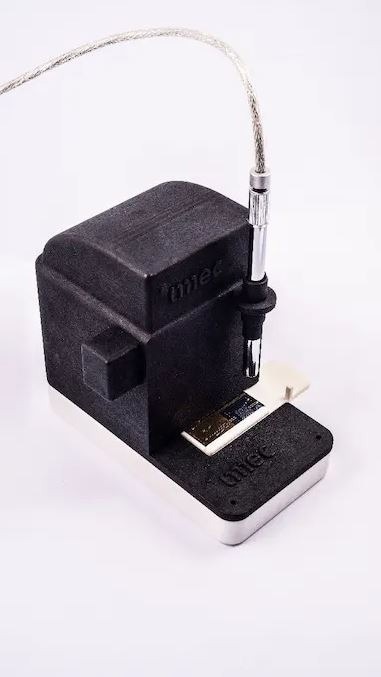The first clinical validation of Imec's cell sort chip technology has been reported in Cells through a new collaboration between Imec and the KU Leuven Laboratory of Tumor Immunology and Immunotherapy. The team successfully identified PD-1 positive T cells in blood samples from 15 ovarian cancer patients. The accuracy of this chip technology matches that of traditional flow cytometry instruments like FACS, which are generally bulky and expensive.
 Imec's cell sorter concept uses integrated star-shaped microheaters to push the target cells into a side channel. Image Credit: IMEC
Imec's cell sorter concept uses integrated star-shaped microheaters to push the target cells into a side channel. Image Credit: IMEC
Imec's Cell Sorter Technology
Imec's innovative cytometry and cell sorter technology utilize microfluidic channels on-chip to precisely guide fluorescently labeled cells towards a laser for excitation, detection, and subsequent sorting. The target cells are effectively separated by vapor bubbles generated in a water-filled microchamber with microheaters. This technology was rigorously tested using patient samples at Imec and the KU Leuven laboratory, demonstrating its effectiveness in detecting specific immune cells, such as CD8+PD-1+ T-cells, with the same efficacy as conventional flow cytometers.
Implications for Cancer Treatment and Immune Profiling
The importance of monitoring the immune system's response during disease and treatment is increasingly recognized, particularly in cancer therapy.
Professor An Coosemans, an expert in tumor immunology and immunotherapy for ovarian cancer, highlights the significance of using flow cytometry for immune profiling. This profiling aids in determining the most effective treatment for a cancer patient and monitoring the treatment's effectiveness. However, the widespread clinical adoption of such immune profiling is hindered by the cost, complexity, and logistical challenges of conventional flow cytometry equipment.
Imec's cell sorter technology addresses these challenges by offering a portable tool, comparable in size to a lunchbox, which can be used in an oncologist's office to check a patient's immune system at various time points. Liesbet Lagae, Imec fellow and inventor of the cell sorter concept, explains that the chip is produced using standard chip technology on 200mm silicon wafers, allowing for mass production at a reasonable cost.
The technology not only enables disposable use to prevent cross-sample contamination but also achieves high throughput without sacrificing sensitivity.
 Cytometry set-up with imec’s cell sorter chip. Image Credit: Imec
Cytometry set-up with imec’s cell sorter chip. Image Credit: Imec
PD-1: A Critical Protein in Guiding Cancer Treatment
The focus of this study on PD-1 positive T cells is particularly relevant in cancer treatment. PD-1, or programmed cell death protein 1, regulates T cell activity and helps balance the immune system after an attack on a foreign invader. However, cancer cells can exploit this mechanism by overexpressing PD-1 ligands to suppress the immune response and grow unchecked.
The ability to monitor PD-1 positive T cells in a patient's blood offers valuable insights into the cancer's immune-evasion strategies, assisting oncologists in deciding on the use of immune checkpoint inhibitor drugs.
Future Directions and Applications
With further development, Imec's cell sorter technology could significantly influence immune profiling in clinical practice, particularly for cancers like ovarian cancer, which is often detected at a late stage.
The next phase of development will integrate the photonic part with multiple lasers for fluorescence excitation and signature collection on a detector array. This technology holds promise not only in cancer therapy but also in fields ranging from proteomics to cell and gene therapy manufacturing, with collaborations already underway with industry partners like Austrian startup Sarcura.
Imec and KU Leuven's partnership has resulted in a clinically relevant project with the potential to transform cancer care. The development of this point-of-care test for immune profiling could revolutionize the approach to cancer treatment, offering a rapid, cost-effective, and personalized therapy monitoring tool.
Source:
Journal reference:
Sarah Libbrecht et al, A Microfluidics Approach for Ovarian Cancer Immune Monitoring in an Outpatient Setting, Cells (2023). DOI: 10.3390/cells13010007